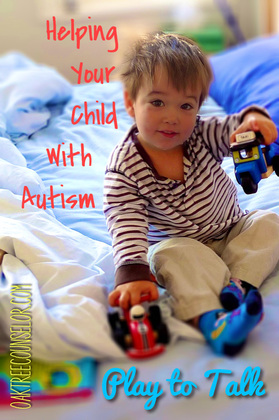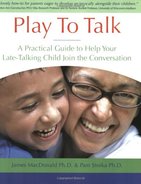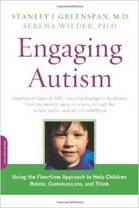 Photo Credit: Henry Burrows via Flickr Photo Credit: Henry Burrows via Flickr  A parent recently told me that her son with autism lives and breathes to play on his iPad and watch YouTube, and that everything else is just "counting the hours". I laughed. A lot. Maybe you kiddo is obsessed with YouTube or Lego® or lining everything up. So... how do we help your child or young adult talk more, engage more effectively and enjoy relationships? It starts with play. These strategies work with any age; though, you'll need to adapt them for young adults or older individuals. CONTINUE READING Play To Talk by James MacDonald & Pam StoikaPlay To Talk: A Practical Guide to Help Your Late-Talking Child Join the Conversation is an excellent resource for helping any child who is late in talking. I'll include a link to the book at the end of the post. The authors focus on teaching parents strategies to encourage back-and-forth interaction, which is the social building block for social skills, relationship, and shared problem solving. Neurotypical children will usually start engaging in back-and-forth interactions very early, for example, turning their head toward the sound of Mom's voice. Over the next several months these interactions become more complicated and involve more turn-taking. Baby smiles, Mom laughs, Baby laughs, etc. (Greenspan, 2006). Many children on the Autism Spectrum engaged in fewer of these back-and-forth interactions as infants. My clients' often continue to have difficulty in conversations and play that require many, many back-and-forth interactions (e.g. reading and interpreting facial expressions, body language, social expectations, motor planning, etc.). So, how can you help? By Taking TurnsWhat's a "turn"? This doesn't refer to letting someone else have a toy or taking turns with the remote, but taking turns interacting. A "turn" could be a statement, a facial expression, a laugh, making a noise or sound effect, pointing, etc. 5 Strategies from Play To Talk
Remember the goalThe goal here is to increase the number of back-and-forth interactions a child can engage in. It is more important to continue the interaction than it is that the play or activity be done "right". You can use these strategies during daily activities, and you should, but let the interaction be more important than the chore. A Great Resource For Parents Play To Talk by James MacDonald, Ph.D. and Pam Stoika, Ph.D., is a great resource for parents. It's full of ideas, suggestions, how-to's, lists, pictures, and is written for a variety of learning styles. It's incredibly practical and the principles can be used with any individual who struggles with language and communication. I encourage anyone in my office parenting a special needs child or adult to read this book. DISCLOSURE: Not much. I have no affiliation with any company, website, or author mentioned here, other than thinking they are awesome. Nor did I receive anything in return for mentioning them.  Engaging Autism by Stanley Greenspan, M.D. and Serena Wieder, Ph.D. is another book I often recommend, that I cited earlier. It's a little more like a textbook and a heavier read, but it provides a solid theoretical approach for a very similar model and the two approaches are very compatible.
|
Nikki Schwartz,
|




 RSS Feed
RSS Feed
